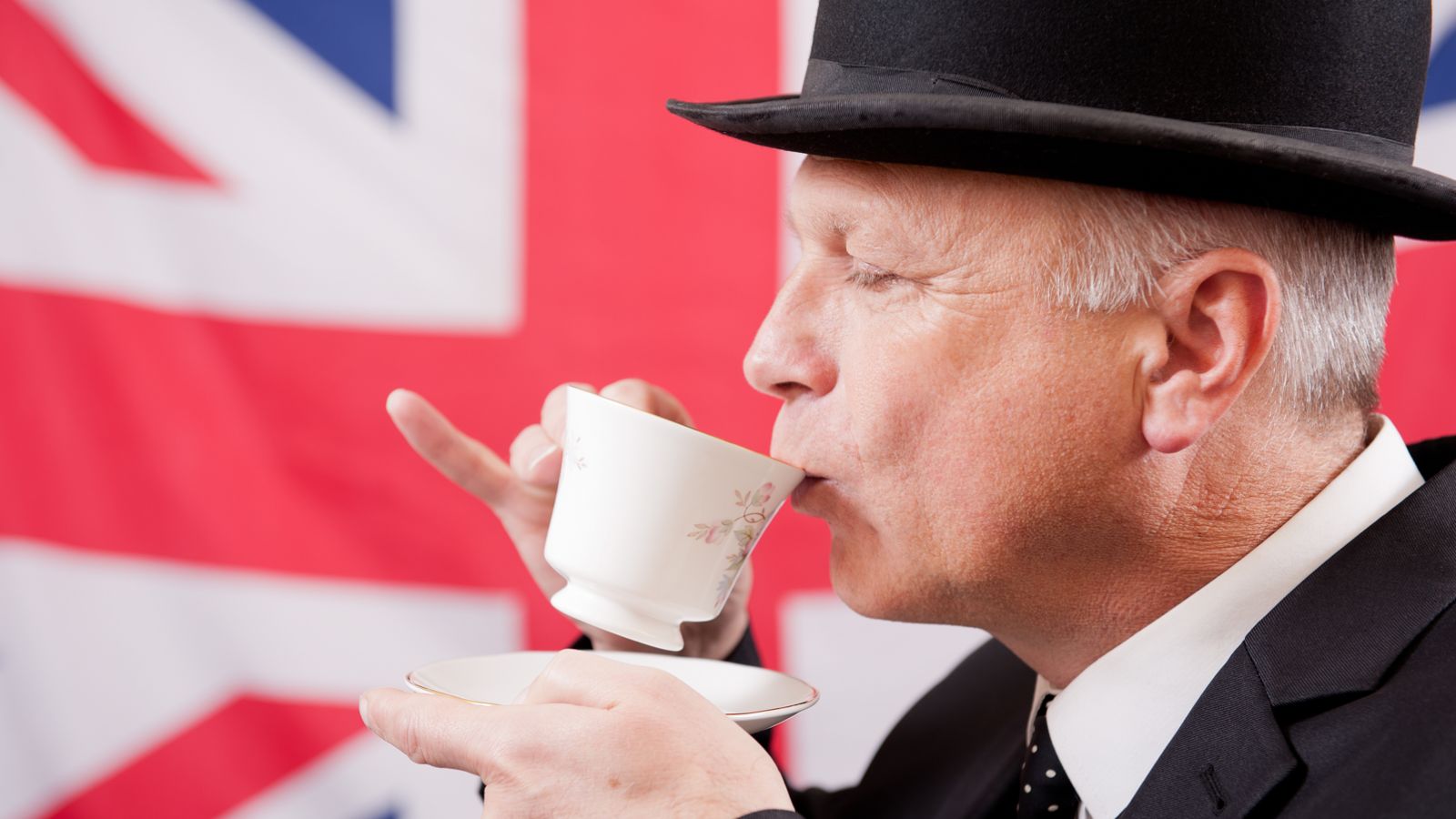Language is constantly changing, evolving, and developing regional variations, so it isn’t surprising that not all English expressions have made it across the pond! Despite speaking the same language, our friends in the United Kingdom sometimes use quintessentially British phrases we Americans don’t understand or recognize—here are 16 of the most bizarre!
“Having a kip”

The American equivalent to this phrase would be “taking a nap” or “catching some shut-eye,” which is used for a short sleep, normally during the day. However, Brits may also say, “I didn’t get much kip,” which would mean they had a poor night’s rest. The expression is typically used in casual settings in the north of England and is a traditional, working-class colloquialism.
“Bodge it.”

In British English, this means to fix something poorly in a less-than-ideal or makeshift way. Americans don’t have a direct equivalent but might say “fixing something up” or “patching it together” instead. Doing “a bodge job” refers to quickly fixing or building something while prioritizing getting the work done over an elegant or long-lasting solution.
“Cheeky”

The Collins Dictionary states, “If you describe a person or their behavior as cheeky, you think that they are slightly rude or disrespectful but in a charming or amusing way.” It can be used for mischievous children or naughty yet harmful animals, but it is a versatile word that can also mean impolite, playful, flirtatious, or harmless, e.g., ‘I just stopped at the pub for a cheeky pint.’
“Chuffed”

This delightful word expresses satisfaction, happiness, or pride due to a recent event, reward, or personal accomplishment. Imagine being absolutely thrilled about something you’ve just achieved or experienced—”chuffed” likely captures that feeling. The word comes from Northern English and originally meant “stuffed with fat,” which was presumably a good thing!
“Right, let’s crack on.”

You may have heard this on UK television or from a British colleague—it’s a commonly used phrase that means something like, “Alright, enough talking, time to take action!” It’s often used after a break from work and is a motivational expression aimed at galvanizing the speaker and those around them into continuing with their original task or goal.
“What a kerfuffle!”

This word is fun to say and describes an unnecessary commotion or fuss. Publication Coach says it originates from the Gaelic word “car” (to twist or bend) and the 16th-century Scottish word “fuffle” (to throw into disorder). While neither word is in use in standard modern English, together they make a silly-sounding word that adds lighthearted good humor into a frustrating situation.
“Going on holiday”

Americans use the term “the holidays” to refer to time off from work for annual celebrations, such as Christmas and Thanksgiving, but use the word “vacation” to refer to leisure travel. In the UK, “going on holiday” means going on vacation and can refer to a visit to see family, domestic travel, or an international trip. Work-related travel, however, would be called a “business trip.”
“Fancy a cuppa?”

Sometimes, national stereotypes are borne from reality. The Brits do indeed enjoy drinking tea, and it’s an important part of British culture and society. Offering someone a “cuppa” is a casual and friendly gesture. It almost always refers to a cup of black tea with milk and/or sugar. It’s a way of inviting someone to take a break, relax, and share their news.
“Mind if I…?”

This means exactly the same as “May I…?” or “Can I…?” in American English but adds a touch more politeness, which the British are well-known for. Instead of merely asking permission, the speaker shows additional consideration for the other person and respect for their time, space, or belongings. They’re asking, “Do you mind?” rather than “Can I do this?”
“Queuing up”

The word “queue” refers to a line of people or cars, and Americans typically say “standing in line” or “waiting in line” instead. However, the New Republic says that the term is being used increasingly in the U.S., largely due to the popularity of British TV shows on Netflix. Queues are always orderly lines where people wait their turn, and the act of joining one is “queuing up.”
“Taking the mickey”

This phrase describes a situation in which a person or authority is doing something blatantly unfair or rude or is teasing or tricking someone. The British sense of humor is notoriously harsh, and this expression is often used for relentless mockery or an ongoing joke, but it is more likely to be an exclamation or complaint rather than a sign of offense.
“What rubbish!”

The best translation of this phrase into American English would be “That’s ridiculous!” or “What nonsense!” It expresses incredulous disbelief and surprise. It’s also used to show frustration or disagreement. The word “rubbish” is a noun used by British people for any type of garbage, but it is also an adjective to describe something that is of poor standard, i.e., as good as trash!
“I couldn’t be bothered.”

Most Americans understand this phrase, but few use it themselves. The expression means “I did not have the motivation to do it” and expresses a feeling of laziness or that the task was pointless or overly time-consuming. In the U.S., most people who lack enthusiasm will say, “I don’t care,” or perhaps even, “I don’t want to put in the effort.”
“That’s pants.”

While only used by certain groups of young people, this casual phrase describes something of poor quality or a negative/unlucky situation. In the UK, the word “pants” doesn’t refer to trousers or legwear; it is exclusively used for underwear, like underpants, boxers, or knickers. The phrase may have originated from the flimsy nature of such garments.
“Having a laugh”

This expression is used when someone isn’t being serious and is synonymous with “joking around.” It is often used in the UK to convey a lack of malice or seriousness and to let others know that the situation is lighthearted. It’s a way of saying, “We’re just having a bit of fun; don’t take it too seriously” so that no one is offended.
“Cheers!”

In British English, this word has several meanings. It is most often used as a casual “thank you” when appreciating small favors among friends. It is also used when toasting and has a similar meaning to “to your health.” Most Americans would use this informal phrase when raising a toast, but not for showing everyday gratitude when a simple “thanks” would probably suffice.
Read More: People Who Had Unhappy Childhoods Usually Develop These 18 Traits

People who go through a lot of traumatic experiences while they’re young can find themselves developing traits that stay with them through adulthood. What are these traits? You’ll find 18 of them in this article.
People Who Had Unhappy Childhoods Usually Develop These 18 Traits
17 of the Most Dangerous Cities in the World (6 Are in The US)

Every city has its dangers, but it goes without saying that some places are far more dangerous than others. We’ve compiled a list of 17 of the most dangerous cities in the world in terms of violent crime and homicide rates.
17 of the Most Dangerous Cities in the World (6 Are in The US)
18 Reasons Why No One Is Interested in Working Anymore

The concept of traditional employment has taken a back seat in recent times with changes in economic and social factors, as well as individual preferences. Traditional jobs have also evolved, and many people don’t feel the need to take this route anymore. These are 18 reasons why no one is interested in working anymore.
18 Reasons Why No One Is Interested in Working Anymore
17 Most Friendly Wild Animals in the World

Are you an animal lover looking to learn more about the curious creatures that inhabit our planet alongside us? Discover the amicable side of the animal kingdom. Meet 17 of the world’s most sociable wild animals, from playful sea creatures to gentle land mammals.
17 Most Friendly Wild Animals in the World
17 Phrases Confident People Use to Stand Up For Themselves

Confidence is a healthy and attractive trait that helps us stand firm in our values and set healthy boundaries. We can always become more confident, and learning the right ways to stand up for yourself is a great way to start. Here are 17 phrases you can use to do so.

